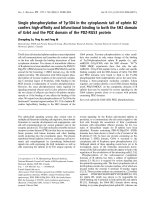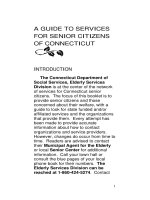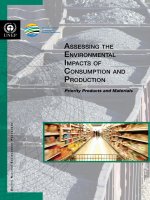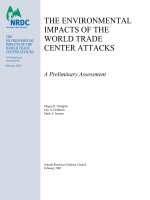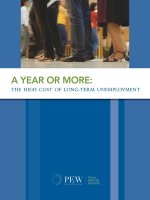Greener Events A guide to reducing the environmental impacts of conferences and seminars potx
Bạn đang xem bản rút gọn của tài liệu. Xem và tải ngay bản đầy đủ của tài liệu tại đây (62.84 KB, 5 trang )
© www.oursouthwest.com October 2010 (first published July 2005)
www.oursouthwest.com is managed by philharding.net
This publication may be reproduced free of charge provided that the source of the publication is acknowledged
Greener Events
A guide to reducing the
environmental impacts of
conferences and seminars
“a great checklist!”
“just received this guide and
would like to say that I will be
very pleased to adopt it”
“a very simple and informative
guide. Even for us, a venue,
this guide is very useful”
This free publication can be found on the
BUSINESS page of www.oursouthwest.com
and is a complimentary management tool for
BSI/ISO sustainable event management systems
Originally written and produced by
Phil Harding & Rachel Malone at the
Government Office for the South West
and recommended by Envirowise &
the Sustainable Development
Commission
© www.oursouthwest.com October 2010 (first published July 2005)
www.oursouthwest.com is managed by philharding.net
This publication may be reproduced free of charge provided that the source of the publication is acknowledged
GREENER EVENTS CHECKLIST
-
for discussions between event managers, venues and suppliers
Venue choice (and equipment)
[ ] Choose a venue that has good access via public
transport & for disabled people
[ ] Ask potential venues for their in-house
environmental policy & priorities
[ ] Choose a venue interested in sustainability issues,
and tell them that’s why you chose them
[ ] Venues offering in-house technical equipment &
support (e.g. staging, audio-visual) can reduce
equipment transportation
[ ] Consider hiring rather than purchasing equipment;
specify the most efficient available
[ ] Consider video conferencing and/or recording the
event for wider (internet) access
CO
2
Emissions (including travel)
(see “Reducing Waste” checklist also)
[ ] Take measures to reduce CO
2
emissions from
delegates travelling to the venue, i.e. provide
information about local public transport (with pedestrian
routes) and encourage its use. Where appropriate
promote car sharing e.g. circulate attendees list in
advance
[ ] Minimise unnecessary lighting, heating / air-
conditioning
[ ] Offset CO
2
emissions arising from the event
Catering & Locally Produced Food
[ ] Plan food requirements carefully to avoid
unnecessary waste (e.g. use event registration form to
obtain information)
[ ] Ensure that dietary requirements are catered for and
offer vegetarian choices
[ ] Plan meals using seasonal local produce wherever
possible. Consider organic produce
[ ] If serving fish, use fish from sustainable sources
[ ] Wherever possible ensure fruit is provided as an
alternative to sweet desserts
[ ] Left over food: consider donating to local charity or
sending for local composting
[ ] Ensure tea/coffee is Fair Trade & provide tap water
as an alternative (if you must use bottled water, make
sure it is local!)
[ ] Minimise use of individually packaged food/drink
items (e.g. provide milk / cream in jugs rather than
individual plastic cartons)
[ ] Use reusable crockery, glassware & cutlery where
possible (to reduce waste)
This is part of “Greener Events”, a guide on
reducing the environmental impacts of
conferences and seminars. There are also
companion guides on outdoor/community events,
presentations & on exhibiting at events
- all available on www.oursouthwest.com
Reducing Waste (& costs)
Pre Event:
[ ] Use websites & email lists to promote the event
[ ] Use double-sided printing for promotional materials
& handouts. Use recycled paper where possible
without laminating it
[ ] Use easily transportable & reusable display
materials
[ ] Seek naturally lighted meeting & exhibition areas
[ ] Format any handouts so as to minimise the
amount of paper used
[ ] Where possible, write material in a re-usable
format (general rather than event specific)
[ ] Minimise the length of the registration form or use
electronic registration where possible & publish the
event itinerary on-line
[ ] Ask the venue to recycle paper & cardboard waste
etc – and to provide suitable recycling bins
[ ] If required, make your own note pads from scrap
paper
At the Event:
[ ] If you are providing delegate packs (if in a folder,
make it re-usable), give these to delegates when they
register on arrival – not beforehand – to avoid
duplication
[ ] Avoid mass distribution of handouts - allow
attendees to download copies from the internet
[ ] Ensure presenters are aware of electronic
presentation facilities & that their presentation will be
distributed electronically after the event
[ ] Provide re-usable name badges (& remember to
collect them at the end of the event!)
[ ] Minimise use of accessories that are harmful to the
environment (e.g. plastic leaflet wallets)
[ ] Feature conference name & date on title slide
rather than single use stage set graphics
[ ] Minimise use of high wattage stage lighting
[ ] Promote energy & water efficiency to participants –
e.g. switch off lights when rooms are not in use
[ ] Use drymark eraser boards rather than paper in
workshop presentations
[ ] Request that any unused items be collected for
use at another event
[ ] Consider including a sustainability activity/session
within the conference to raise awareness
Post Event:
[ ] If not issued at the event, send out delegate
feedback questionnaire by email
[ ] Give any feedback you have to the venue
© www.oursouthwest.com October 2010 (first published July 2005)
www.oursouthwest.com is managed by philharding.net
This publication may be reproduced free of charge provided that the source of the publication is acknowledged
Introduction
“What a business produces, how it buys and
sells, how it affects the environment, how it
recruits, trains and develops its own people,
how it invests in the community and respects
the rights of people - all these add together to
form the impact of that business on society”
Business in the Community
There are many ways organisations can improve their
contribution to sustainable development and reduce
their environmental impacts but one area that is often
overlooked is the use of resources and the release of
carbon dioxide emissions associated with conferences
and seminars.
The increased use of video conferencing facilities is
helping to reduce the need to travel for small meetings.
However for conferences and seminars, where there is
a specific need to gather many delegates and speakers
together in one place, there are significant opportunities
available for ensuring that environmental impacts are
minimised.
Keep in mind that you cannot expect to improve
everything at once but you can make a start on several
key aspects of event management. Decide on what’s
important to you and everyone involved and aim for
continuous improvement with how you organise and
deliver your events.
You should also keep under continuous review the
issues raised in this guide with your suppliers.
Using this guide
This guide has been produced to help event managers
reduce some of the negative environmental impacts
that large conferences and seminars can have on the
environment and suggests ways in which these can be
minimised or eliminated - whilst providing social and
economic benefits also.
It is recommended that this guide is used to help select
a suitable venue and to aid planning discussions with
management and staff at the venue. A copy should be
passed to the venue manager by the event manager.
The GREENER EVENTS CHECKLIST within
this guide can be discussed with the venue manager
during the early negotiations in the course of planning
the event.
Key Factors
The four key factors to consider when organising or
supporting events are as follows:
1. Venue Choice (and audio visual)
Suitability of the venue can mean more than just its
layout and facilities. Other facilities or amenities in the
area and appropriateness for the theme of the event
can be important factors. However, where possible,
venues chosen should:
be close to public transport which reduces the
need for delegates to travel by car; and
have good in-house green housekeeping
policies that include active promotion of
recycling, energy efficiency and purchasing
locally produced food or using suppliers that
use local produce.
Note. For hotels, the ‘Green Tourism Business
Scheme’ includes a green audit.
To maximise access to information whilst reducing
environmental impacts, consider recording (audio,
video, or video linked to slides) your event for
subsequent access via the internet. This can ensure
many more people take advantage of the information
afterwards - thus greatly improving the return on
investment from your event - and delegates can re-
visit the elements that are important to them.
2. CO
2
Emissions
Wherever possible, larger regional conferences and
seminars, i.e. those attracting around 50+ delegates,
should be arranged as “carbon neutral” events so that
these events do not make a net contribution to global
warming that leads to climate change.
© www.oursouthwest.com October 2010 (first published July 2005)
www.oursouthwest.com is managed by philharding.net
This publication may be reproduced free of charge provided that the source of the publication is acknowledged
2. CO
2
Emissions (continued)
This means event managers need to:
Firstly: reduce the carbon dioxide (CO
2
)
emissions arising from energy use by
encouraging delegates to travel to the venue by
public transport or car sharing. CO
2
emissions at
the venue itself can be reduced by pursuing
energy efficiency measures and some venues
may even use less polluting energy sources, i.e.
renewable energy.
Secondly: offset the unavoidable CO
2
emissions
by purchasing “carbon offsets”.
Carbon can be offset via specialist
companies/organisations that invest in technologies
that reduce CO
2
emissions (energy efficiency and
renewable energy) or by sequestering carbon (and thus
absorbing CO
2
) through tree planting.
Example of a climate neutral event
From 2001 to 2009 ENVEC, the South West’s annual
climate change conference organised by the
Government Office for the South West and others, has
been carbon neutral.
Each year ENVEC attracted some 250-300
delegates. Based on those numbers and taking
account of carbon saving measures and energy used at
the conference venue, ENVEC offset 12 tonnes of CO
2
each year.
If your organisation is supporting or managing several
events during the year, it may be sensible, and reduce
administrative costs, to purchase the carbon offset
centrally in one single payment to the carbon offset
company/organisation. You should check this with your
Central Services Department or Finance Team.
There are several companies/organisations that
provide carbon offsets through investing in low carbon
technologies, forest restoration projects etc. These
include:
Climate Care
www.jpmorganclimatecare.com
Co2balance
www.co2balance.com
The Carbon Neutral Company
www.carbonneutral.com
CLEVEL
www.clevel.co.uk
Note. Inclusion in the above list does not represent an
endorsement of those companies by this guide, merely an
acknowledgement of their existence.
The websites of most companies that provide carbon
offsets can show you how to calculate CO
2
emissions.
It may be possible in some instances for the
investment to be made in your region – this can be
discussed with the carbon offset company.
The important point to note is that any investment
should provide new and additional carbon
savings/sequestration that would not otherwise
happen. Simply subsidising projects that are already
planned would not provide a true carbon offset for
your event.
For further information on carbon offsetting see the
link on this guide’s web page (on the BUSINESS page
of www.oursouthwest.com).
The Low Carbon Hierarchy
The most cost-effective solution for reducing your
carbon footprint is to:
1. REDUCE energy use by avoiding unnecessary use
and implementing energy efficiency measures. You
should include the design of your goods and services
and also look up and down your supply chain. Once
you have increased your efficiency you should then
look to
2. REPLACE fossil fuels with renewable energy
sources and/or use cleaner fossil fuel technology such
as Combined Heat and Power (CHP) where it is
feasible to do so. Finally, having reduced your carbon
emissions through avoiding waste, energy efficiency
and use of renewable cleaner sources, you can
3. NEUTRALISE the remaining unavoidable
emissions through carbon offsetting schemes.
© www.oursouthwest.com October 2010 (first published July 2005)
www.oursouthwest.com is managed by philharding.net
This publication may be reproduced free of charge provided that the source of the publication is acknowledged
3. Locally Produced Food
There are good reasons for supporting the local food
sector by using local food produced in the local area (or
within the region) wherever possible:
Economic – essentially purchasing local food helps
keep money in the local economy, creating/maintaining
jobs and prosperity for the local (predominantly rural)
workforce. The Sustainable Development Commission
has estimated that every £10 spent locally generates
£25 for the local economy – the local multiplier effect.
Social - local food marketing makes consumers more
aware of and interested in the origin of food, helping to
improve their links with and understanding of the rural
economy, food production, land management and rural
community issues. Furthermore, the local multiplier
effect can help improve the standard of living in poorer
communities allowing people to afford more nutritious
food that’s better for their health.
Environmental - local foods can provide an important
added value outlet for the products of traditional (and
more extensive) farming systems that conserve
landscape and biodiversity. Food miles, the distance
food travels from producer to end-user, are also
reduced thus reducing the air pollution and CO
2
emissions associated with transport.
4. Reducing Waste (& costs)
Waste represents one of the major environmental
challenges facing the UK. In England and Wales, for
example, over 100 million tonnes of household,
industrial and commercial waste is produced annually.
We are running out of space for putting waste into
landfill and this is not the best or safest approach to
dealing with waste.
It makes good business sense for the venue also if its
waste disposal costs associated with your event can be
minimised (see also Section 2 “Reducing CO
2
emissions” concerning the need to reduce energy
waste). It is increasingly important, therefore, that
event managers minimise the waste of resources
associated with their events - and this will have the
added benefit of helping to reduce the cost of running
the event.
In addition to energy use the other main resource
used at events is paper and printing materials, much
of which ends up as waste within days. Don’t hand
out expensive literature liberally; over 60% of
exhibition handouts, for example, is thrown away.
If you feel the need to provide your delegates with free
gifts (‘freebies’), make sure that they are at least
useful, re-usable and, where possible, made from
sustainable materials.
The Greener Events Checklist
The single page “Greener Events Checklist” within
this guide is provided to help event managers discuss
their requirements with potential venues.
Event managers can refer the guide to potential
venues to highlight the fact that these are the range
and type of issues to be addressed in choosing the
venue as well as in organising and running the event.
The checklist can also serve as an aide memoir when
discussing options with the chosen venue’s
management. Venues can also use this guide and the
checklist to help ensure events held on their premises
have a lower impact on the environment.
And finally…
don’t forget to tell your delegates that
the event has been arranged in partnership with the
venue to specifically reduce the event’s environmental
impact, and review the issues raised by this guide on
a continuous basis with your suppliers.
You could also use the following wording on your
event programme/invitation: Organised in accordance
with the principles of the nationally recognised
“Greener Events” guide on www.oursouthwest.com.
Alternatively use the greener events logo on
www.oursouthwest.com.
To engage your staff on sustainability issues, you
might like to consider forming a ‘Green Team’ within
your organisation.
Note:
This guide (& its companion guides on
outdoor/community events, presentations and exhibiting at
events) will be updated periodically. Users are therefore
advised to make sure they are using the latest version(s)
posted on www.oursouthwest.com when event planning.
